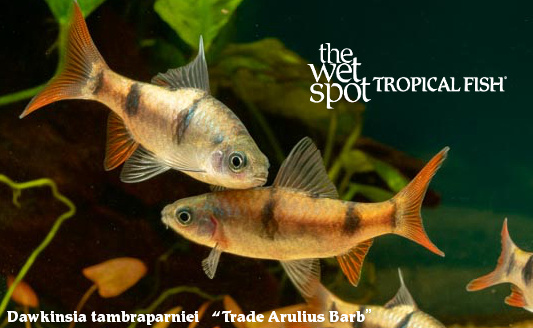"Trade Arulius Barb"
Dawkinsia tambraparniei
$8.99 – $29.99
Please note that the fish shown in the photo is not the exact fish you will receive and is only a representative of what a specimen will look like. The color may vary based on the age and sex (if listed as unsexed) of the fish you receive.
Description
Dawkinsia tambraparniei, also known as Trade Arulius Barb, is a species of freshwater fish native to India. Here’s a summarized bullet point list for their care, including their maximum size:
**Max Size:**
– Adults typically reach a maximum size of about 5 to 5.5 inches (13 cm).
**Tank Requirements:**
– Minimum tank size of 30 gallons for a small group (6 or more is recommended).
– A well-filtered aquarium with gentle to moderate water flow.
– Provide ample hiding spots through plants, caves, or driftwood.
– Substrate can be fine gravel or sand to mimic their natural environment.
**Water Parameters:**
– Temperature: 72°F to 78°F (22°C to 26°C).
– pH: 6.5 to 7.5.
– Hardness: Soft to moderately hard water.
**Tank Setup:**
– Use live plants like Java moss, Java fern, and Anubias for a natural feel.
– Provide open swimming areas along with hiding spots to cater to their active and shy behavior.
– A dark substrate can help bring out their vibrant colors.
**Feeding:**
– Omnivorous species that require a varied diet.
– Offer high-quality flake or pellet food supplemented with live or frozen options.
– Include small foods like brine shrimp, daphnia, and bloodworms to mimic their natural diet.
**Behavior and Compatibility:**
– Peaceful and social fish suitable for community tanks.
– Keep them in groups of 6 or more to reduce stress and promote natural behaviors.
– Compatible with other small, peaceful species that share similar water parameters.
**Water Maintenance:**
– Perform regular water changes of 20-30% to maintain water quality.
– Monitor ammonia, nitrite, and nitrate levels to ensure a healthy environment.
– Vacuum substrate during water changes to remove debris.
**Breeding:**
– These fish are egg scatterers.
– Provide fine-leaved plants or a spawning mop for them to lay eggs.
– Remove adults after spawning to prevent them from eating the eggs.
– Raise the fry on infusoria and later baby brine shrimp.
**General Tips:**
– Avoid keeping them with larger or aggressive species to prevent stress and potential harm.
– Provide a well-balanced diet to ensure their health and vibrant colors.
– Regular observation of their behavior can help detect any health issues early.
Remember that individual fish may have slightly different preferences, so closely monitoring their behavior and adjusting care accordingly is key to their well-being.
DAW0D16D
Related products
-

"Red Fin Rasbora"
$3.99 Out of Stock This product has multiple variants. The options may be chosen on the product page
Rasbora ennealepis -

"Cherry Spot Rasbora"
$3.99 – $4.99 Select options This product has multiple variants. The options may be chosen on the product page
Rasbora rubrodorsalis -

"Ocelot Danio"
$4.99 Out of Stock This product has multiple variants. The options may be chosen on the product page
Danio sp. -

"Leopard Danio"
$2.99 Select options This product has multiple variants. The options may be chosen on the product page
Danio frankei

